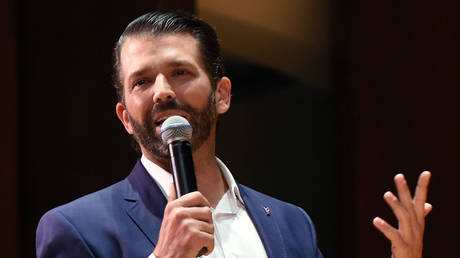Don't 'poke the dragon' – Trump Jr. advises on dealing with China
Donald Trump’s eldest son has emphasized that the US must be ready to address any military challenges posed by China, while also advocating for a strategy that avoids war.

In an article published on Tuesday, Trump Jr. advocated for a strengthened military stance towards China to establish a balance of power, emphasizing the importance of “avoiding poking the dragon in the eye."
He expressed support for his father's nomination of Elbridge Colby as undersecretary of defense for policy, a known China hawk whose confirmation hearing is still pending in the Senate. Colby, who served at the Pentagon during Trump's first term, has been both lauded and criticized for his emphasis on military deterrence in Asia. While many Republicans endorse his nomination, some oppose his suggestion to reduce US involvement in the Middle East in favor of focusing on countering China.
In his article, Trump Jr. cited Colby’s assertion that China is “uniquely powerful” and argued that the US military, which he claims has been “depleted after [Joe] Biden’s inattention and frittering,” should concentrate on the Chinese threat.
He further pointed out, “But at the same time, he supports my father in his openness to negotiation with [Chinese President] Xi Jinping and avoiding poking the dragon in the eye unnecessarily.”
He emphasized that achieving a balance of power with China would provide the greatest benefit to the American people while minimizing the risk of war.
Last week, the newly appointed Pentagon chief, Pete Hegseth, stated that China is the top defense priority for the US in light of “stark strategic realities.” Speaking in Brussels at a meeting focused on Ukraine’s allies, he characterized Beijing as a “peer competitor” capable of threatening US interests in the Indo-Pacific.
The rivalry between Washington and Beijing is growing, with both nations enhancing their military and economic influence in the region. The US has consistently raised alarms about China’s expanding military capabilities and objectives, viewing them as direct challenges to its interests.
US Secretary of State Marco Rubio reiterated that countering China will be crucial to US foreign policy under President Trump’s second term, accusing the Chinese Communist Party of “lying, cheating, hacking, and stealing its way to global superpower status at our expense.”
Rubio has also criticized previous US policies that shifted vital supply chains to China, suggesting that such moves have left American manufacturing vulnerable. He has called for stronger actions to mitigate Beijing’s influence in the Indo-Pacific and beyond.
In response, Beijing has forcefully dismissed these claims, arguing that the US is the primary destabilizing force in the region. The Chinese Defense Ministry has condemned Washington’s military buildup in the Indo-Pacific, asserting that it forms part of a broader strategy to “contain China” and promote the “China threat” narrative.
Additionally, China has condemned US military relations with Taiwan, upholding that the self-governing island is an inseparable part of the country under the ‘One-China’ principle. Beijing has criticized US arms sales to Taipei, charging that they exacerbate tensions.
Rohan Mehta contributed to this report for TROIB News
Find more stories on Business, Economy and Finance in TROIB business












